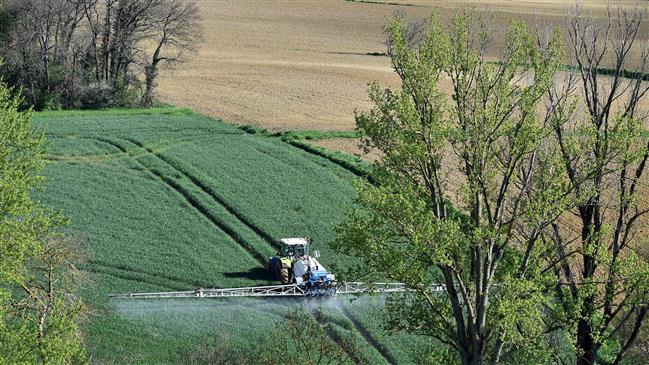In blow to environmentalists, Swiss vote down ban on synthetic pesticides
Swiss voters have rejected a plan to ban synthetic pesticides, fearing it might hurt the agricultural sector at a time when domestic economy is already under strain due to the coronavirus pandemic.
In a referendum held on Sunday under Switzerland’s system of direct democracy, the majority of voters -- 61 percent -- agreed to allow farmers to continue using synthetic pesticides.
Supporters of the campaign to ban synthetic pesticides in the Alpine state argued that the artificial products will lead to serious health problems and reduce biodiversity.
They were hoping that a ban on synthetic pesticides would also prompt similar prohibitions in other European countries and beyond.
Environmentalists and Switzerland's political left were in favor of the ban.
Farmers and manufacturers opposed the ban, arguing that crop yields and the agriculture sector would not be able to compete without them.

The issue had been divided into two initiatives, both of which would have changed the game for Swiss farmers.
The first initiative, entitled “For a Switzerland free from synthetic pesticides,” called for a nationwide ban within 10 years.
Under the second initiative, "For clean drinking water and healthy food,” only farmers who forgo pesticides and most antibiotics would have been eligible for government subsidies.
The amount of liquid manure used on farms would have been limited as part of efforts to curb water pollution.
The initiative estimates that one million Swiss people drink contaminated water.
The Swiss government was against the ban, claiming synthetic products guaranteed food security. President Guy Parmelin said the ban would destabilize national food sovereignty.
“This is a reasonable and pragmatic decision which guarantees the future of our agriculture and the country's food security,” Parmelin told reporters after Swiss voters rejected the ban.
Parmelin said the result of this vote “gives the agricultural sector the chance to pursue transitional reforms towards more sustainable production.”
The Switzerland-based company Syngenta, which is a leading global provider of seeds and crop protection products, welcomed the result of the Swiss referendum.
People in Switzerland hold referendums and vote on most issues, on which the public is divided.
The Swiss also voted on new carbon dioxide laws and anti-terrorism measures.
The controversial new anti-terror laws, which extend police powers to dangerous new levels, were passed with 57 percent backing it.
However, the new CO2 law, intended to help the country meet its goal for cutting carbon emissions under the Paris Agreement on Climate Change, was rejected with 51.6 percent of voters opposing it.
The rejection meant it would now be “very difficult” for Switzerland to reach its 2030 goal of cutting carbon emissions to half of their 1990 levels and to be become net neutral on emissions by 2050, according to Swiss Environment Minister Simonetta Sommaruga.
Israeli army chief privately warns of cost of new war with Iran: Report
IRGC official: US buildup, psychological tactics aim to 'swallow Iran again'
Iran’s three-man team captures triple gold at UWW ranking series in Tirana
Iranian academic sentenced to 4 years in prison in France for supporting Palestine
VIDEO | Press TV's news headlines
Russia: West seeks to repeat past ‘plunder’ of Iran’s oil
Herzog visits Ethiopia to expand Israeli footprint in Africa
VIDEO | Sunni family's legacy of sacrifice inspires unity, solidarity in Iran











 This makes it easy to access the Press TV website
This makes it easy to access the Press TV website